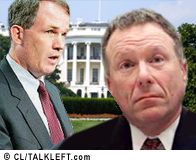"Mr. Libby will show that the snippets of conversation at issue in this case took place amid a rush of pressing national security matters that commanded his attention throughout his long and stressful work day," the attorneys wrote. They plan to buttress their claims of inadvertent error by turning to a memory expert from the University of California at Los Angeles, Robert Bjork.
A summary of Mr. Bjork's proposed testimony said his conclusions are based on a range of memory research, including two papers with political overtones. One is a study of testimony from a Nixon White House aide, John Dean, about his conversations with President Nixon. Another is a review of Mr. Bush's claims to have learned of the first plane to hit the World Trade Center on September 11, 2001 from video he saw before the second plane struck.
I've uploaded Libby's motion and letter to Fitzgerald so you can read them. My initial take, as someone who has litigated and lectured extensively on the issue of memory in the context of eye-witness evidence: The testimony should be admitted and the conclusions the expert makes are correct. [Part of my brief requesting the admission of memory expert testimony at trial for Timothy McVeigh is here.]
The expert only should be allowed to explain the principles of memory and memory failure to the jury. He should not be allowed to render an opinion as to whether Libby's memory failed since that's the ultimate question for the jury to decide.
Good move by Team Libby. I hope it advances the public's knowledge about the fallibility of human memory. More wrongful convictions are caused by faulty eye-witness testimony than any other factor, and it's not because the witnesses are lying, it's because they are mistaken and too often the police don't use proper procedures when interviewing them.




